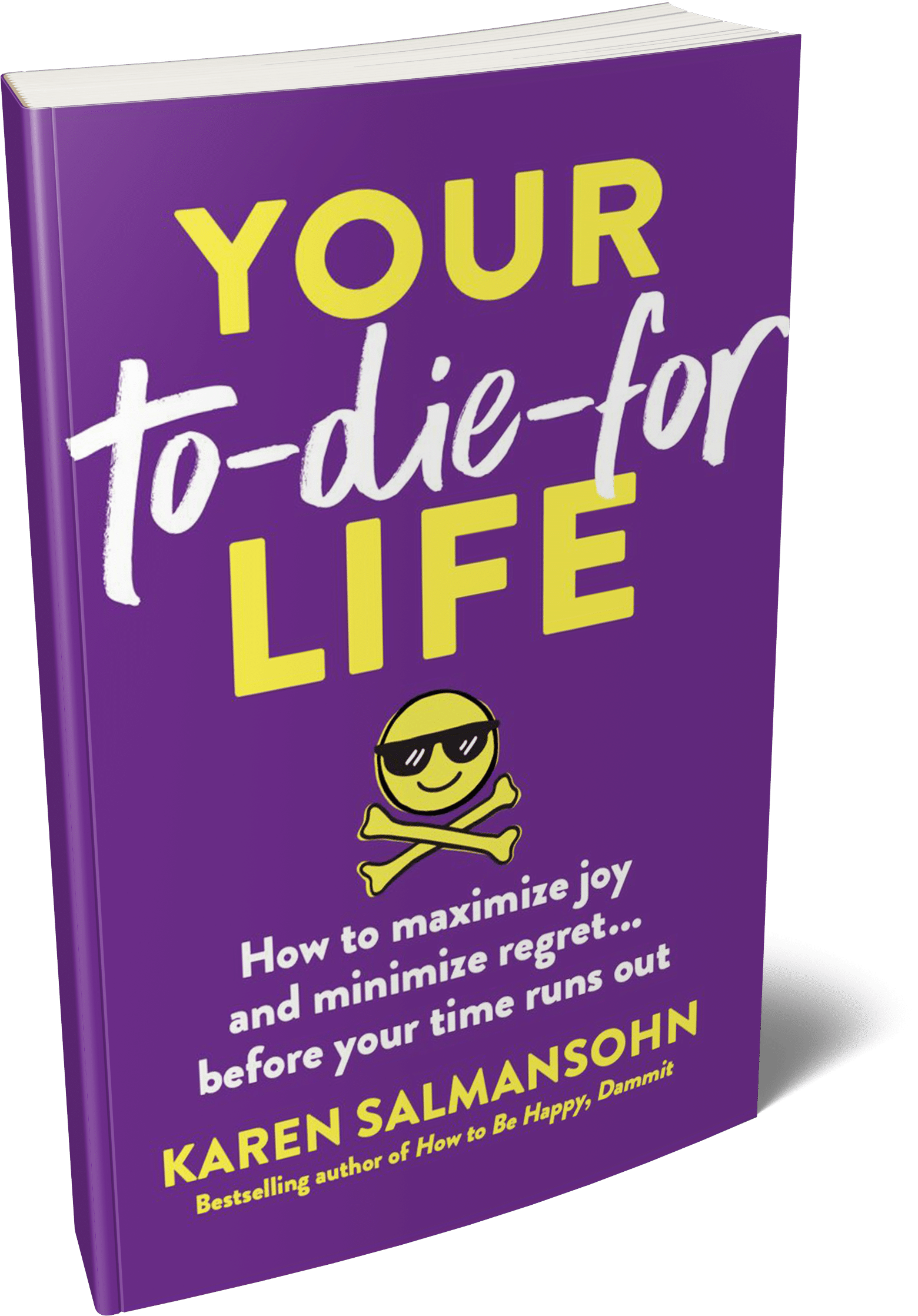
Get A Sneak Peek at my book “Your To-Die-For Life”!
Get a FREE sneak peek! Learn how to use Mortality Awareness as a wake up call to live more boldly.
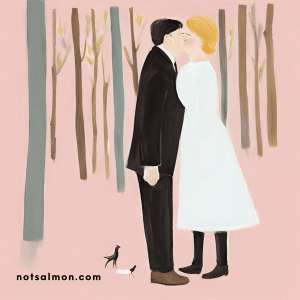 Here are some good reasons to save your marriage or relationship – recognizing the for better or for worse part of your love commitment. Learn 10 helpful strategies.
Here are some good reasons to save your marriage or relationship – recognizing the for better or for worse part of your love commitment. Learn 10 helpful strategies.
Note: This is a great essay to send to people who just got engaged, or are getting married, or are going through a rough spot in their marriage – to encourage them to save their marriage.
When you get married, the phrase “for better or for worse” gets tossed around like a salad that everyone pretends to enjoy – but nobody really wants to eat.
“For better or for worse” is the kind of optimistic, pre-game rally cry – which sounds splendid in the echo-chamber of a church, synagogue, or Elvis-themed Vegas chapel.
But the truth about marriage is – when you’re standing there in your wedding clothes – doused in optimism – reciting the “for better or for worse” part of your marriage vows – you don’t really think the “for worse” part will ever come knocking.
However…It’s easy to love someone when they’re fresh out of the shower, smelling like lavender and making you breakfast.
It’s something else to love them when they’re down with the flu, resembling a character from “The Walking Dead,” and they’ve just used the last of the toilet paper.
Or when you witness how your partner buckles under strain – or discover the in-laws never fail to mention how much weight you’ve gained.
And so it’s all sunsets and smooches – until the Instagram filter on your marriage slips off.
As a result, this “for worse part” becomes the reason why so many marriages can wind up hitting the rocks.
The “for worse” part is the test of true love.
Because true love means wading through hurt and sacrifice.
It is about relentless patience and intentional kindness.
It’s the kind of love that is less about driving off into the sunset – and more about being willing to push the car when it breaks down on the side of the road.
It is the commitment to embrace the chaos of another person’s demons. To dance with them, and not run for the door when the clock strikes midnight and the perfect fairy tale part of your romance transforms into reality.
 You buckle up, try to laugh, and put in the effort to remember why you chose this person to be your co-captain in the first place.
You buckle up, try to laugh, and put in the effort to remember why you chose this person to be your co-captain in the first place.
You dig deep, past the annoyance and the irritation, to the love that’s rooted underneath.
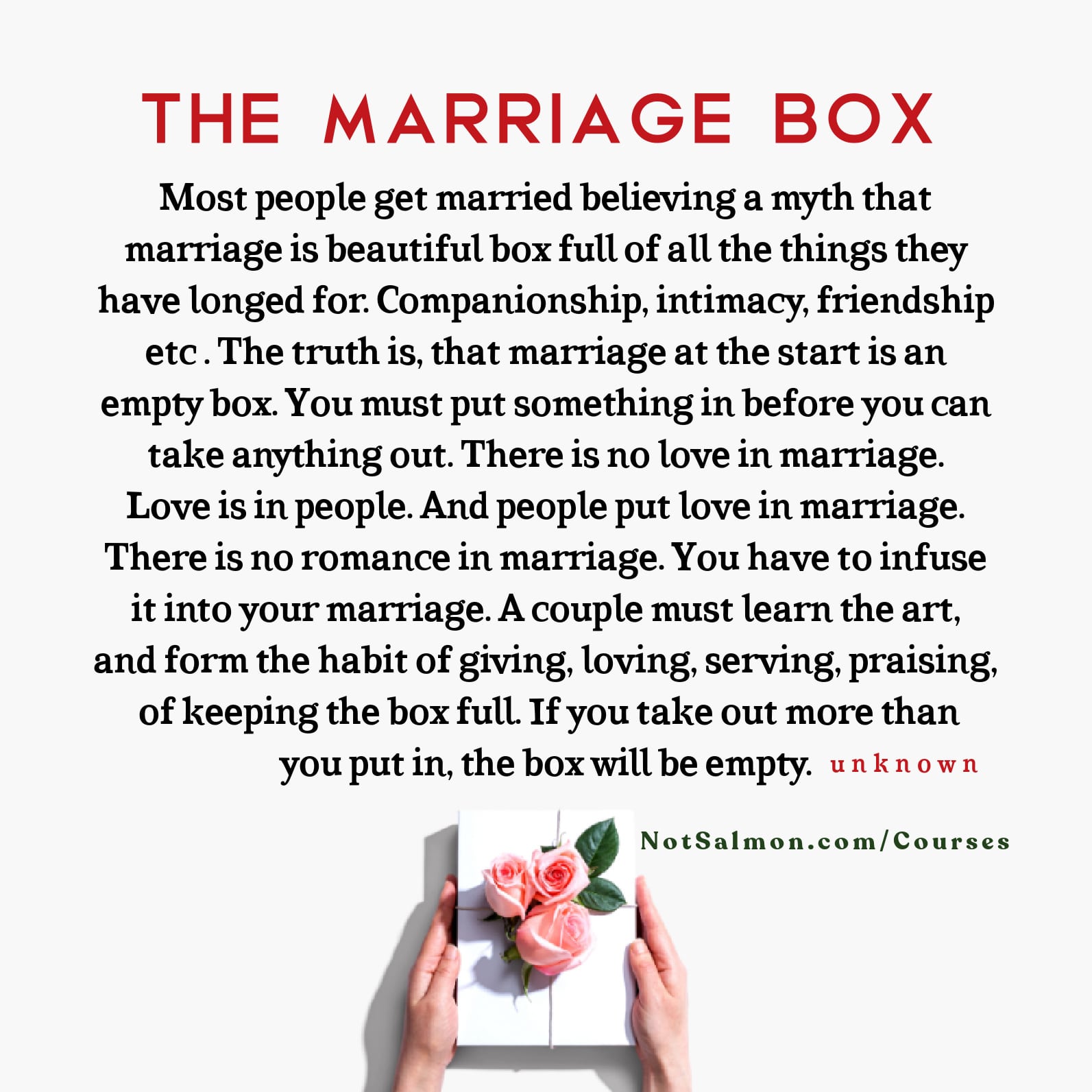 When you get down to the marrow of it…
When you get down to the marrow of it…True love is about the fine art of sticking together even when the glue of romance gets a bit tacky.
It’s about accepting there will be those unglamorous parts of love – like discussing mortgage rates – or the color of your child’s snot – and finding the humor and connection within that.
It is about finding your partner’s obsession with organizing the dishwasher both infuriating… and endearingly human.
It’s about being two flawed humans embracing their flaws – and trying to make sense of a flawed world – together.
Because anyone can stay married when it’s all sunsets and sex.
It takes a real, raw human to look at the person you promised to spend your life with and say, “I choose you,” even when this person can sometimes be more annoying than an unsolicited robocall.
There will be days when you’ll think about what it would be like to have the whole bed to yourself.
To not have to deal with someone else’s hair in the drain.
But then, there will also be days when the light catches your partner just so.
Or they say something so undeniably them.
And you’ll think, “Ah, screw it. This is my person.”
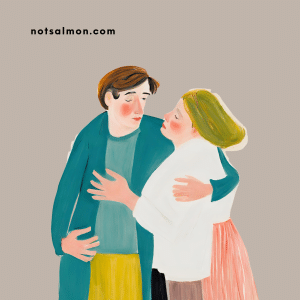 Here’s the deal: Every morning you wake up next to this person who has seen you at your worst – like, “flu-virus, no-makeup, existential-dread” worst.
Here’s the deal: Every morning you wake up next to this person who has seen you at your worst – like, “flu-virus, no-makeup, existential-dread” worst.
Because staying married isn’t a one-time choice. It’s a daily decision.
True love is about choosing each other, again and again.
Even when the choice feels hard.
And even when the world outside your door seems like it’s filled with easier options.
So to choose to stay married when it’s easier to get out – this is a testament to the human spirit’s stubbornness and capacity for growth.
There are exceptions of course – when relationships are truly dysfunctional.
When love feels like being the only one rowing a two-person boat.
In these cases, choosing to sail solo isn’t about quitting.
It’s about recognizing that commitment means paddling together, not drowning alone.
I believe if you are open to listening, laughing, empathizing, growing – you can save your marriage when you hit those “for worse” parts.
Because true love is for the warriors, the comedians, the realists, and the life learners – anybody who fully understands that “for better or for worse” is not just a vow. “For better or for worse” is the most meaningful heads-up you can give someone. It means you promise that when you see the “for worse” you won’t simply run.
I know about this personally – because I went through the “for worse” with my partner – and we were able to come out on the other side – to the “for the better” part – and we’ve been enjoying life together for over fourteen years and counting.
How? Well, I learned a lot of relationship tools and strategies from renowned experts like John Gottman, Mark Goulston, Michael Gurian and then some.
Because I am a bestselling behavioral change expert – I was lucky enough to snag one on one interviews with these experts – and talk with them up close and personally.
Afterwards, I applied what I learned – and mended my relationship.
And so I morphed these strategies into what became a bestselling relationship program – called The Secrets of Happy Couples Online Course – which is couples therapist recommended.
Coming up next I am going to dive deep into the not-so-subtle art of staying married – when every piece of unsolicited advice from your Uber driver tells you to bail at the first sign of discomfort.
Don’t wait for your relationship to resemble a scene from a disaster movie before you start fixing things. Address issues as they crop up, not when they’ve built up into an emotional Godzilla ready to destroy everything in its path.
Spotting problems in your marriage shouldn’t be like a passive-aggressive treasure hunt. Treat your marriage issues like a business plan for your shared life. Identify the challenges, then brainstorm solutions together – as if you’re plotting to produce a “Newer, More Improved Version of Your Love Relationship.”
Criticism is the arsenic of relationships. It poisons slowly. Focus on expressing needs and desires without blaming, shaming or making your partner feel like they’re the big problem in your relationship. Mindfully stop going after your partner’s character with the precision of a ninja. “You always” this, “You never” that. Instead start using “I” statements that don’t feel like accusations.
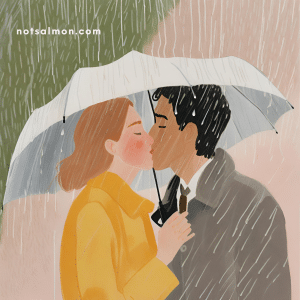 When you’re dishing out contempt, you’re not just mad. You’re looking down from your moral high horse. (Note: John Gottman considers “contempt” one of the “4 Horses of the Apocalypse” that obliterates relationships.)
When you’re dishing out contempt, you’re not just mad. You’re looking down from your moral high horse. (Note: John Gottman considers “contempt” one of the “4 Horses of the Apocalypse” that obliterates relationships.)
So stop spitting verbal fireballs.
I know, easier said than done. However, there is a do-able way to reduce contempt. Start being a “positive evidence collector” about the good stuff in your partner. Make it a daily mission to spot things you love about them. Like a skilled detective, the more you look for positives, the more you’ll find them.
Eventually this appreciation will douse the fireballs of contempt.
Feeling attacked? The knee-jerk reaction is to shield yourself and deflect – hoping to bounce the criticism away. Instead get curious about what your partner is saying – and try to see things from their point of view. Maybe you did leave your socks in the living room for the hundredth time. Admit where you’ve slipped up.
Stonewalling is The Great Emotional Freeze-Out. You’re there, but not. You’ve shut down, tuned out, and hit the mute button. According to Gottman, stonewalling is the most harmful way to deal with conflict – even worst than fighting. Because it makes your partner feel like they don’t matter to you at all. What to do instead? Lean into self soothing. When the heat turns up, give yourself permission to step away and cool down. Take a walk, listen to your favorite song, or do grounding and meditation exercises. Your goal is to return to your partner with a clearer head – prepared to listen and talk.
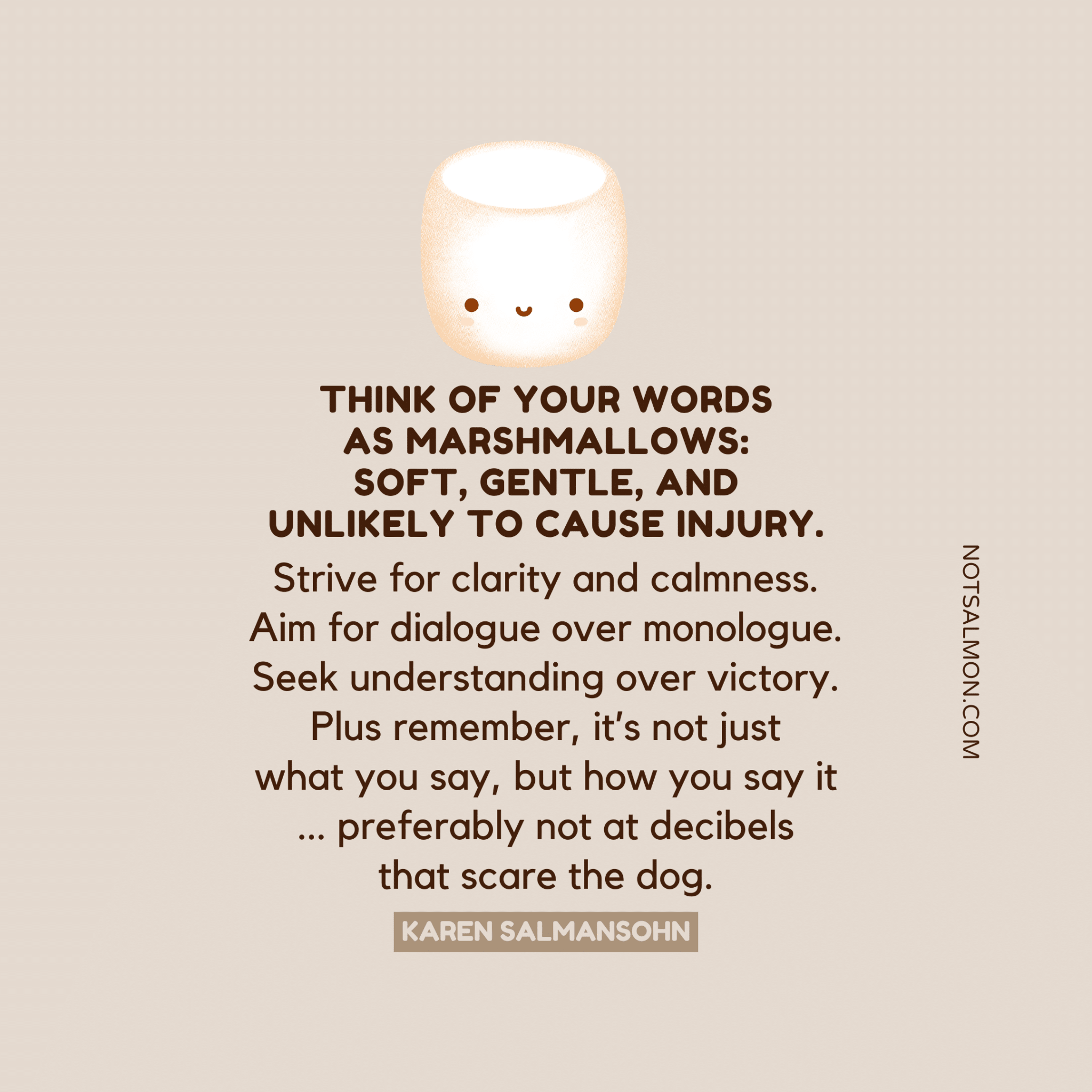 Approach conflicts with kindness and empathy, as if diffusing a bomb – rather than igniting one.
Approach conflicts with kindness and empathy, as if diffusing a bomb – rather than igniting one.
Think of your words as marshmallows: soft, gentle, and unlikely to cause injury.
“Can you please clean the dishes?” beats “Why are you auditioning for ‘Hoarders’?”
Think of your love partner as your friend. If your friend spills wine on your rug, it’s fine. So if your partner does, don’t make it a catastrophe.
Try to aim for universal gentleness, empathy and meaningful conversation.
Words are powerful. Wield them with care. Strive for clarity and calmness. Aim for dialogue over monologue. Seek understanding over victory. Plus remember, it’s not just what you say but how you say it—preferably not at decibels that scare the dog.
Understanding your own emotions is the first step to not letting your emotions control your actions. Recognize your triggers, past wounds, and feelings. Name them. “Hello, abandonment issues from my mom passing when I was four.”
Think of commitment as a muscle that needs regular exercise. Flex it daily with actions and decisions that align with your shared goals, not just with the occasional anniversary card.
If your relationship has been feeling unstable, and you want to save your marriage, then you might want to talk to a Behavioral Change Expert Coach like myself. Sign up for a free consultation call here.
Or explore my bestselling and couples therapist recommended digital program: The Secrets of Happy Couples Online Course. This course pulls back the curtain on research-based secrets of lasting love – the kind that survives beyond the honeymoon phase – and thrives in the daily grind.
P.S. Before you zip off to your next Internet pit stop, check out these 2 game changers below - that could dramatically upscale your life.
1. Check Out My Book On Enjoying A Well-Lived Life: It’s called "Your To Die For Life: How to Maximize Joy and Minimize Regret Before Your Time Runs Out." Think of it as your life’s manual to cranking up the volume on joy, meaning, and connection. Learn more here.
2. Life Review Therapy - What if you could get a clear picture of where you are versus where you want to be, and find out exactly why you’re not there yet? That’s what Life Review Therapy is all about.. If you’re serious about transforming your life, let’s talk. Learn more HERE.
Think about subscribing for free weekly tools here.
No SPAM, ever! Read the Privacy Policy for more information.